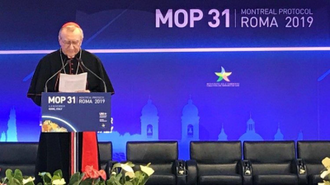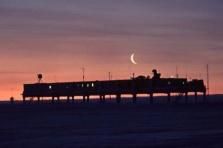Pope praises Montreal Protocol to protect ozone layer

Yesterday, Pope Francis sent a message to the 31st Meeting of the Parties to the Montreal Protocol on Substances that Deplete the Ozone Layer, praising their work.
In his message, read at the Rome meeting by Cardinal Pietro Parolin, Vatican Secretary of State, the Holy Father described the Protocol as a "model of international cooperation, not only in the area of environmental protection, but also that of the promotion of integral human development."
The Montreal Protocol is an addendum to the Vienna Convention for the Protection of the Ozone Layer, which provides a framework for international reductions in the productions of certain chemicals that contribute to the destruction of the ozone layer in the earth's atmosphere. As Pope Francis noted, this became "the first Convention of the United Nations system to gain universal endorsement on the part of the entire family of nations". One hundred ninety-six States, as well as the European Union, have signed the agreement.
Pope Francis noted the positive results that have been achieved since the signing of the Vienna Convention thirty-five years ago. "In fact", he said, "many scientific studies, including more recent ones, attest to how the thinning of the ozone layer is gradually being reduced".
Pope Francis focussed on three lessons that can be learned since the implementation of the international ozone regime.
First, he pointed to the cooperation among various sectors of human society that led to the accord. "This cooperation has shown how we can achieve important outcomes" that make it possible to safeguard creation and promote human development.
The second lesson is that the "cultural challenge" we face "cannot be met solely on the basis" of a technological solution that ignores "the mysterious network of relations between things, and so sometimes solves one problem only to create others". He noted the adoption of the Kigali Amendment to the Montreal Protocol, which aims at prohibiting substances that lead to global warming, even if they don't directly harm the ozone layer; and he announced the Holy See's adherence to that Amendment.
Finally, Pope Francis spoke about the importance of recognising that "everything is connected", noting that the Kigali Amendment appeals to this principle. "Careful consideration of the various interconnections of our decisions and their resulting impact involves numerous levels of complexity", he said.
Pope Francis concluded his letter by urging all to ask the question of whether the goals of progress are "truly directed to the common good" or, instead, "cause harm to our world and to the quality of life of much of humanity."
An appropriate response to that question, he said, can only be made in light of the three lessons he had already indicated: "First, to give real life to dialogue for the sake of shared responsibility for the care of our common home, one in which no one 'absolutises' his or her own point of view. Then, to make technological solutions part of a broader vision that takes into consideration the variety of existing relationships. Finally, to structure our decisions on the basis of the central concept of what we can call 'integral ecology', grounded in the realisation that 'everything is connected'".
















